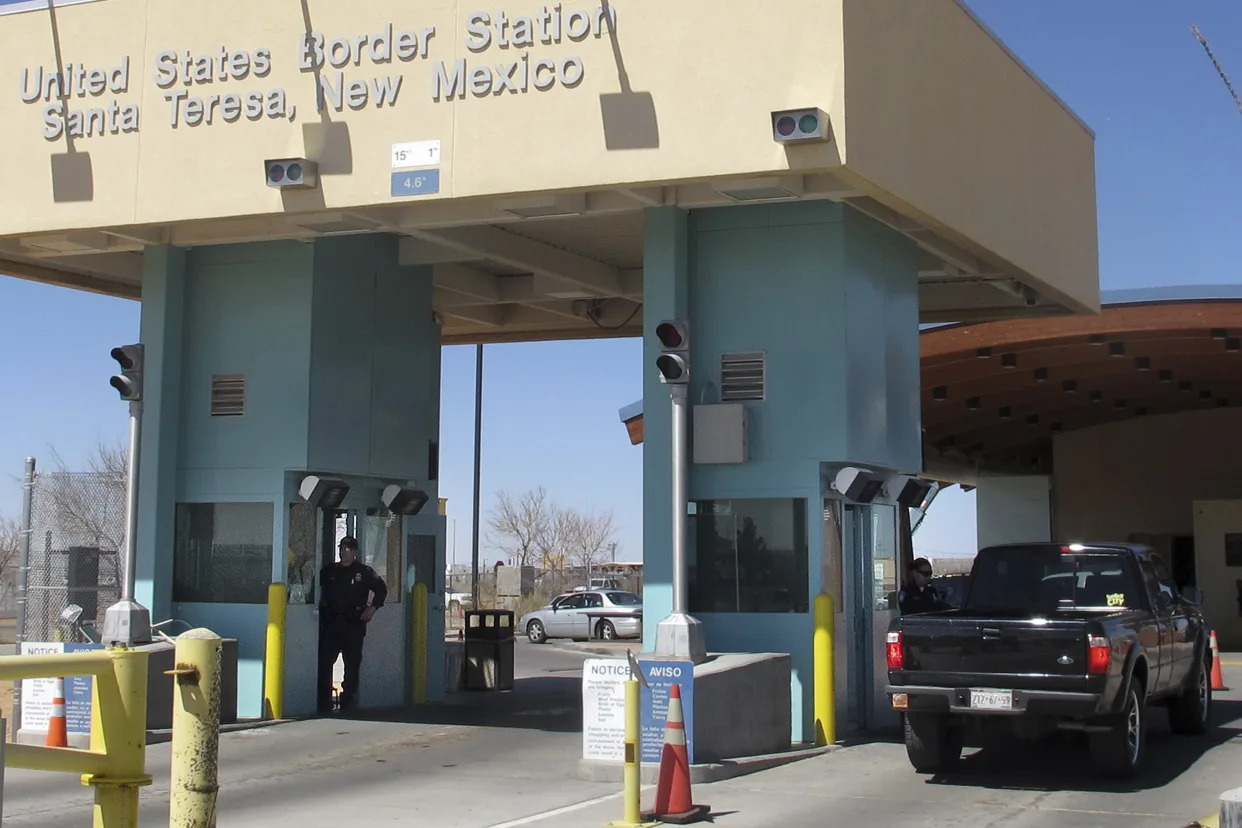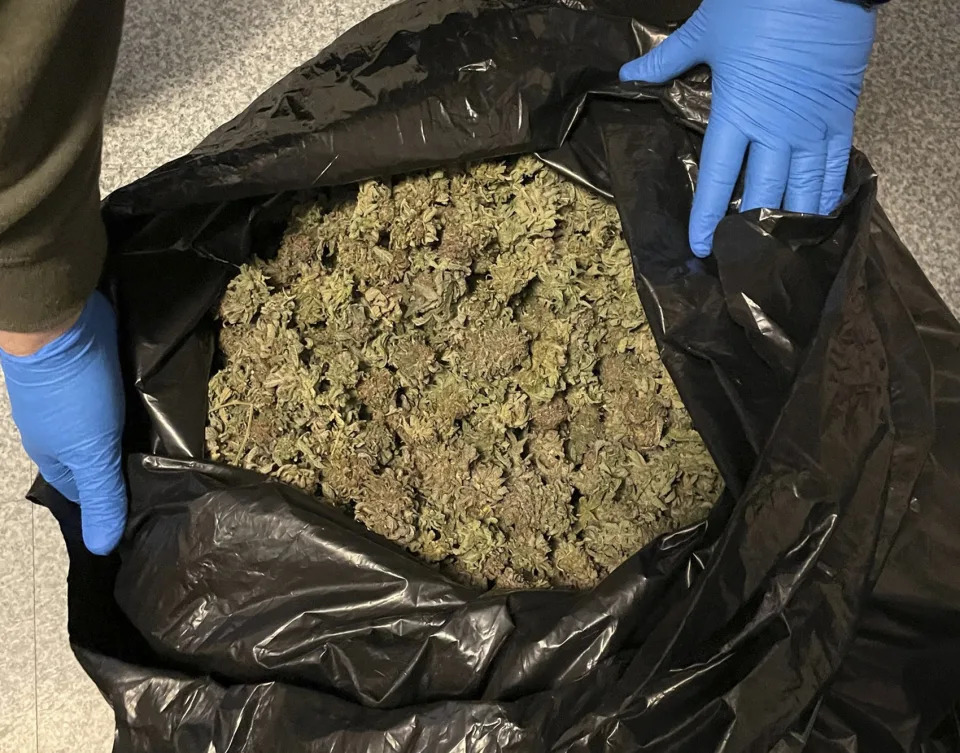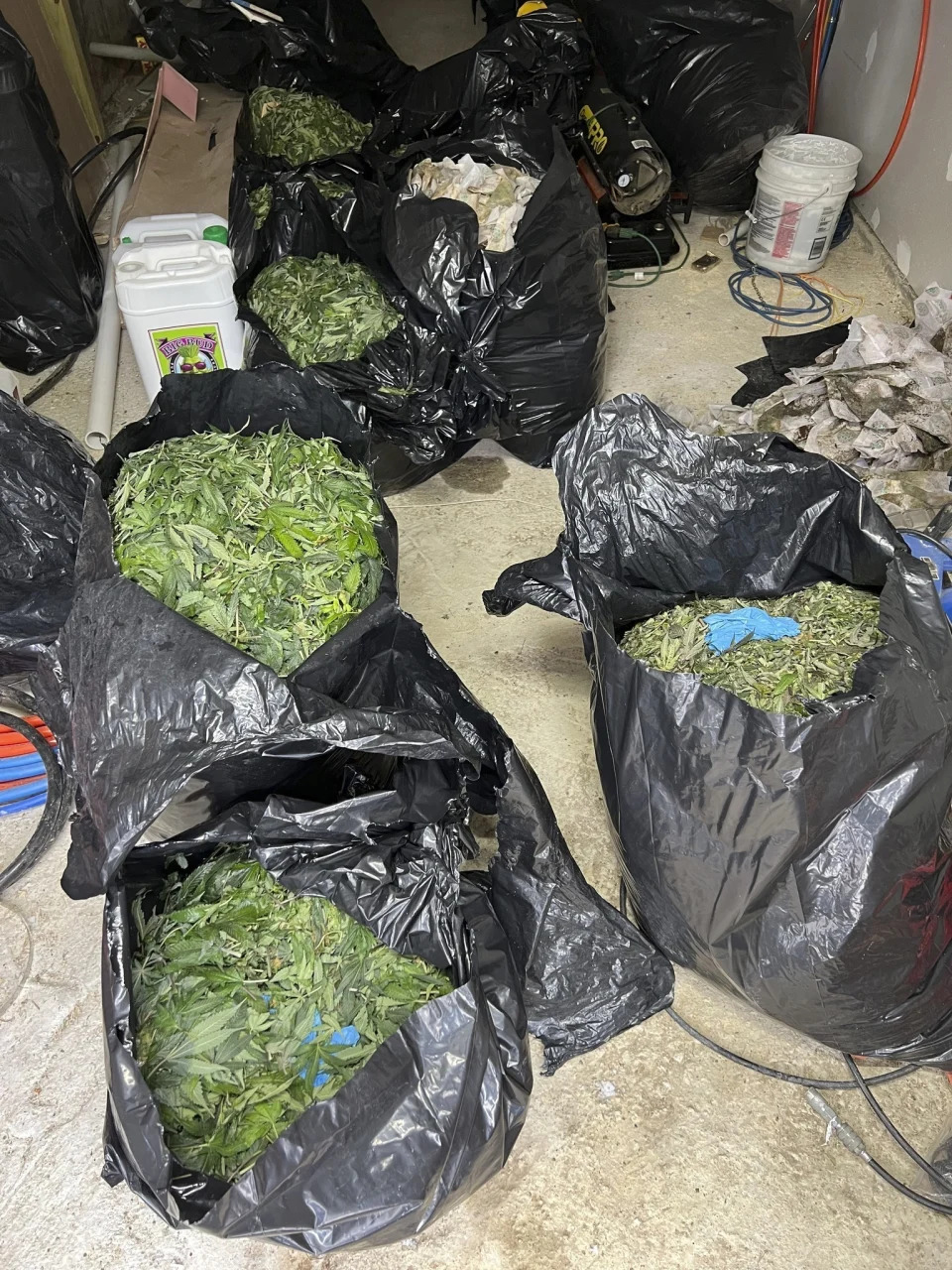MORGAN LEE
Fri, April 19, 2024

Traffic crosses from Mexico into the United States at a border station in Santa Teresa, N.M. The U.S. Border Patrol is asserting its right to seize cannabis shipments — including state-authorized commercial supplies — amid complaints of licensed cannabis providers that more than $300,000 worth of marijuana has been confiscated in recent months at Border Patrol highway checkpoints in southern New Mexico.
SANTA FE, N.M. (AP) — The U.S. Border Patrol is asserting its authority to seize cannabis shipments — including commercial, state-authorized supplies — as licensed cannabis providers file complaints that more than $300,000 worth of marijuana has been confiscated in recent months at highway checkpoints in southern New Mexico.
New Mexico's Democratic governor says the disruptions prompted a discussion this week with U.S. Homeland Security Secretary Alejandro Mayorkas, whose impeachment charges were dismissed this week. Gov. Michelle Lujan Grisham says she voiced concerns that the scrutiny of cannabis companies appears to be greater in New Mexico than states with regulated markets that aren't along the U.S. border with Mexico.
Authorized cannabis sales in New Mexico have exceeded $1 billion since regulation and taxation of the recreational market began two years ago. Yet cannabis transport drivers say they have been detained hours while supplies are seized at permanent Border Patrol checkpoints that filter inbound traffic for unauthorized migrants and illegal narcotics, typically located about 60 miles (100 kilometers) from the U.S. border.
“Secretary Mayorkas assured the governor that federal policies with respect to legalized cannabis have not changed,” said Lujan Grisham spokesperson Michael Coleman in an email. “Regardless, the governor and her administration are working on a strategy to protect New Mexico’s cannabis industry.”
Managers at 10 cannabis businesses including transporters last week petitioned New Mexico's congressional delegation to broker free passage of shipments, noting that jobs and investments are at stake, and that several couriers have been sidelined for “secondary inspection” and fingerprinted at Border Patrol checkpoints.
“We request that operators who have had product federally seized should be allowed to either get their product returned or be monetarily compensated for the losses they've sustained," the letter states.
U.S. Sen. Martin Heinrich said the Department of Homeland Security should be focused on urgent priorities that don't include cannabis suppliers that comply with state law.
“Stopping the flow of illicit fentanyl into our country should be the Department of Homeland Security’s focus at these checkpoints, not seizing cannabis that’s being transported in compliance with state law," the senator said in a statement, referring to the parent agency for U.S. Customs and Border Patrol. "New Mexicans are depending on federal law enforcement to do everything they can to keep our communities safe. Our resources should be used to maximize residents’ safety, not distract from it.”
A public statement Thursday from the U.S. Border Patrol sector overseeing New Mexico provided a reminder that cannabis is still a “Schedule 1” drug, a designation also assigned to heroin and LSD.
"Although medical and recreational marijuana may be legal in some U.S. States and Canada, the sale, possession, production and distribution of marijuana or the facilitation of the aforementioned remain illegal under U.S. federal law," the agency's statement said. “Consequently, individuals violating the Controlled Substances Act encountered while crossing the border, arriving at a U.S. port of entry, or at a Border Patrol checkpoint may be deemed inadmissible and/or subject to, seizure, fines, and/or arrest."
Matt Kennicott, an owner of Socorro-based High Maintenance, a cannabis business, said seizures by Border Patrol started in February without warning and create uncertainty about shipments that include samples for consumer-safety testing. He said cannabis producers in southernmost New Mexico rely on testing labs farther north, on the other side of Border Patrol checkpoints, to comply with safeguards against contaminants like mold or pesticides.
“It's not a little confusing, it's a lot confusing,” he said. “We're trying to figure out where this directive came from.”
Marijuana grow-op busted in Maine as feds investigate trend in 20 states
DAVID SHARP
Sat, April 20, 2024


This photo provided by Penobscot County Sheriff's Office shows the seizure of 40 pounds of processed marijuana from a hidden grow operation by a Chinese citizen in Maine. Court documents detailing how Xisen Guo, a Chinese man came to Maine to transform a rural house into a high-tech, illicit grow operation were detailed in court files unsealed this week with the arrest of the alleged operator, Friday, April 19, 2024.
DAVID SHARP
Sat, April 20, 2024


This photo provided by Penobscot County Sheriff's Office shows the seizure of 40 pounds of processed marijuana from a hidden grow operation by a Chinese citizen in Maine. Court documents detailing how Xisen Guo, a Chinese man came to Maine to transform a rural house into a high-tech, illicit grow operation were detailed in court files unsealed this week with the arrest of the alleged operator, Friday, April 19, 2024.
(Penobscot County Sheriff's Office via AP)
PORTLAND, Maine (AP) — The high electricity consumption of a home, its cardboard-covered windows and odor of marijuana drew law enforcement's attention to an illicit grow operation off the beaten path in rural Maine.
The bust of the home with a hidden grow operation and seizure of nearly 40 pounds (18 kilograms) of processed marijuana marked the latest example of what authorities describe as a years long trend of foreign nationals to exploit U.S. state laws that have legalized cannabis for recreational or medical use to produce marijuana for the illicit markets in the U.S.
The U.S. Drug Enforcement Administration is investigating international criminal organizations that are operating illegal marijuana grows in about 20 states, including Maine, Attorney Garland Merrick Garland told the Senate Appropriations Committee this week, in response to a question raised by Republican Sen. Susan Collins of Maine.
Federal law enforcement officials said there currently are about 100 illicit grow operations in Maine, like the one in Passadumkeag, about 60 miles (96.5 kilometers) north of Bangor, and about 40 search warrants have been issued since June.
In Passadumkeag, Xisen Guo, a naturalized U.S. citizen born in China, has been accused of transforming the house into a high-tech, illicit grow operation, according to court documents unsealed this week.
He was ordered held without bail Friday on federal drug charges, making him the first person to be charged federally in such a case in Maine. A detention hearing is scheduled for Monday.
The Internal Revenue Service and Department of Homeland Security, along with the FBI and DEA and local law enforcement, are working together to get to the bottom of the illicit grow operations in Maine, Garland said.
The state legalized adult consumption of marijuana, but growers must be licensed by the state. The Maine Office of Cannabis Policy said Guo was operating an unlicensed operation, according to court documents.
The illicit grow operations across the U.S. began cropping up several years ago. In 2018, U.S. authorities arrested a Seattle woman, conducted raids and seized thousands of marijuana plants during an investigation of an operation with Chinese ties. Oklahoma officials learned straw owners in China and Mexico were running illegal operations after marijuana was legalized by the state for medical purposes in 2018.
The legality of marijuana consumption and cultivation in those states tends to provide cover for illegal grow operations, which may draw less attention, officials said. The marijuana is then trafficked in states where it's illegal.
In Maine, U.S. Attorney Darcie McElwee said thwarting illegal growing operations with international connections is a priority for law enforcement, “and we will continue to marshal every tool at our disposal in this effort as appropriate.”
Law enforcement officials know the tell-tale signs.
Police zeroed in on the Passadumkeag operation in part because of the home's utility bills reviewed by deputies. After the home was purchased for $125,000 cash, the electricity use went from about $300 a month to as high as nearly $9,000, according to court documents.
That’s consistent with heat pumps, costly lighting and other gear needed to grow marijuana, investigators said. The home owner, a limited liability company, upgraded the electric capability to double what is found in a typical Maine home, according to documents.
Guo's attorney didn’t immediately return a call from The Associated Press. Two others who were at the home at the time of the police raid in February were released and not charged.
McElwee said law enforcement — from local and county police to the FBI and DEA — are starting to make headway with “dozens of operations" shuttered over the last several months.
“The possible involvement of foreign nationals using Maine properties to profit from unlicensed marijuana operations and interstate distributions makes it clear that there is a need for a strong and sustained federal, state and local effort to shut down these operations," she said.
Law enforcement officials also continue to investigate who is directing the operations and where the profits are going, she said.
PORTLAND, Maine (AP) — The high electricity consumption of a home, its cardboard-covered windows and odor of marijuana drew law enforcement's attention to an illicit grow operation off the beaten path in rural Maine.
The bust of the home with a hidden grow operation and seizure of nearly 40 pounds (18 kilograms) of processed marijuana marked the latest example of what authorities describe as a years long trend of foreign nationals to exploit U.S. state laws that have legalized cannabis for recreational or medical use to produce marijuana for the illicit markets in the U.S.
The U.S. Drug Enforcement Administration is investigating international criminal organizations that are operating illegal marijuana grows in about 20 states, including Maine, Attorney Garland Merrick Garland told the Senate Appropriations Committee this week, in response to a question raised by Republican Sen. Susan Collins of Maine.
Federal law enforcement officials said there currently are about 100 illicit grow operations in Maine, like the one in Passadumkeag, about 60 miles (96.5 kilometers) north of Bangor, and about 40 search warrants have been issued since June.
In Passadumkeag, Xisen Guo, a naturalized U.S. citizen born in China, has been accused of transforming the house into a high-tech, illicit grow operation, according to court documents unsealed this week.
He was ordered held without bail Friday on federal drug charges, making him the first person to be charged federally in such a case in Maine. A detention hearing is scheduled for Monday.
The Internal Revenue Service and Department of Homeland Security, along with the FBI and DEA and local law enforcement, are working together to get to the bottom of the illicit grow operations in Maine, Garland said.
The state legalized adult consumption of marijuana, but growers must be licensed by the state. The Maine Office of Cannabis Policy said Guo was operating an unlicensed operation, according to court documents.
The illicit grow operations across the U.S. began cropping up several years ago. In 2018, U.S. authorities arrested a Seattle woman, conducted raids and seized thousands of marijuana plants during an investigation of an operation with Chinese ties. Oklahoma officials learned straw owners in China and Mexico were running illegal operations after marijuana was legalized by the state for medical purposes in 2018.
The legality of marijuana consumption and cultivation in those states tends to provide cover for illegal grow operations, which may draw less attention, officials said. The marijuana is then trafficked in states where it's illegal.
In Maine, U.S. Attorney Darcie McElwee said thwarting illegal growing operations with international connections is a priority for law enforcement, “and we will continue to marshal every tool at our disposal in this effort as appropriate.”
Law enforcement officials know the tell-tale signs.
Police zeroed in on the Passadumkeag operation in part because of the home's utility bills reviewed by deputies. After the home was purchased for $125,000 cash, the electricity use went from about $300 a month to as high as nearly $9,000, according to court documents.
That’s consistent with heat pumps, costly lighting and other gear needed to grow marijuana, investigators said. The home owner, a limited liability company, upgraded the electric capability to double what is found in a typical Maine home, according to documents.
Guo's attorney didn’t immediately return a call from The Associated Press. Two others who were at the home at the time of the police raid in February were released and not charged.
McElwee said law enforcement — from local and county police to the FBI and DEA — are starting to make headway with “dozens of operations" shuttered over the last several months.
“The possible involvement of foreign nationals using Maine properties to profit from unlicensed marijuana operations and interstate distributions makes it clear that there is a need for a strong and sustained federal, state and local effort to shut down these operations," she said.
Law enforcement officials also continue to investigate who is directing the operations and where the profits are going, she said.
No comments:
Post a Comment